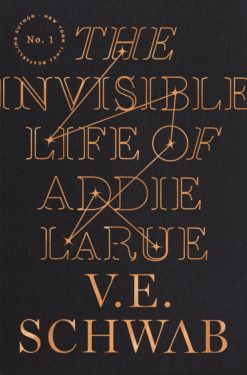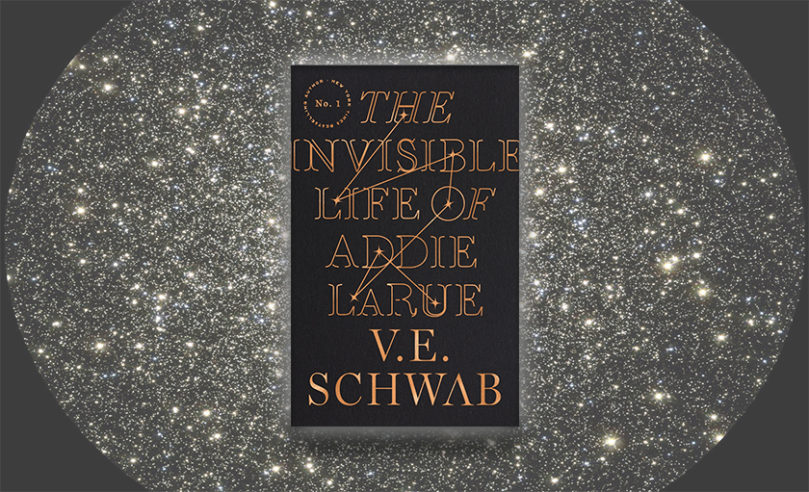
In the vein of The Time Traveler’s Wife and Life After Life, The Invisible Life of Addie LaRue is New York Times bestselling author V. E. Schwab’s genre-defying tour de force.
A Life No One Will Remember. A Story You Will Never Forget.
France, 1714: in a moment of desperation, a young woman makes a Faustian bargain to live forever—and is cursed to be forgotten by everyone she meets.
Thus begins the extraordinary life of Addie LaRue, and a dazzling adventure that will play out across centuries and continents, across history and art, as a young woman learns how far she will go to leave her mark on the world.
But everything changes when, after nearly 300 years, Addie stumbles across a young man in a hidden bookstore and he remembers her name.
Please enjoy this free excerpt of The Invisible Life of Addie LaRue, on sale 10/06/2020.
Paris, France
July 29, 1715
IV
Dreamer is too soft a word.
It conjures thoughts of silken sleep, of lazy days in fields of tall grass, of charcoal smudges on soft parchment.
Addie still holds on to dreams, but she is learning to be sharper. Less the artist’s hand, and more the knife, honing the pencil’s edge.
“Pour me a drink,” she says, holding out the bottle of wine, and the man pries out the cork and fills two glasses from the low shelf of the rented room. He hands her one, and she doesn’t touch it as he throws his back in a single swallow, downs a second before abandoning the glass and reaching for her dress.
“Where’s the rush?” she says, guiding him back. “You’ve paid for the room. We have all night.”
She is careful not to push him away, careful to keep the pressure of her resistance coy. Some men, she’s found, take pleasure in disregarding the wishes of a woman. Instead, Addie lifts her own glass to his hungry mouth, tips the rust-red contents between his lips, tries to pass the gesture off as seduction instead of force.
He drinks deep, then knocks the glass away. Clumsy hands paw at her front, fighting with the laces and the stays.
“I cannot wait to . . .” he slurs, but the drug in the wine is already taking hold, and soon he trails off, his tongue going heavy in his mouth.
He sags back onto the bed, still grasping at her dress, and a moment later his eyes roll back and he slumps sideways, lost to sleep before his head strikes the thin pillow.
Addie leans over and pushes until he rolls off the bed, hitting the floor like a sack of grain. The man lets out a muted groan, but does not wake.
She finishes his work, loosening the laces of her dress until she can breathe again. Paris fashion—twice as tight as country clothes, and half as practical. She stretches out on the bed, grateful to have it to herself, at least for the night. She does not want to think about tomorrow, when she is forced to start again.
That is the madness of it. Every day is amber, and she is the fly trapped inside. No way to think in days or weeks when she lives in moments. Time begins to lose its meaning—and yet, she has not lost track of time. She can- not seem to misplace it (no matter how she tries) and so Addie knows what month it is, what day, what night, and so she knows it has been a year.
A year since she ran from her own wedding. A year since she fled into the woods.
A year since she sold her soul for this. For freedom. For time.
A year, and she has spent it learning the boundaries of this new life. Walking the edges of her curse like a lion in its cage. (She has seen lions now. They came to Paris in the spring as part of an exhibit. They were nothing like the beasts of her imagination. So much grander, and so much less, their majesty diminished by the dimensions of their cells. Addie went a dozen times to see them, studied their mournful gazes, looking past the visitors to the gap in the tent, the single sliver of freedom.)
A year she’s spent bound within the prism of this deal, forced to suffer but not die, starve but not waste, want but not wither. Every moment pressed into her own memory, while she herself slips from the minds of others with the slightest push, erased by a closing door, an instant out of sight, a moment of sleep. Unable to leave a mark on anyone, or anything.
Even the man slumped on the floor.
She draws the stoppered bottle of laudanum from her skirts, and holds it to the meager light. Three tries, and two bottles of the precious medicine wasted before she realized she could not drug the drinks herself, could not be the hand that did the harm. But mix it in the bottle of wine, reset the cork, and let them pour their own glass, and the action is no longer hers.
See?
She is learning.
It is a lonely education.
She tips the bottle, the last of the milky substance shifting inside the glass, and wonders if it might buy her a night of dreamless sleep, a deep and drugged peace.
“How disappointing.”
At the sound of the voice, Addie nearly drops the laudanum. She twists around in the small room, scouring the dark, but cannot find its source.
“I confess, my dear, I expected more.”
The voice seems to come from every shadow—then, from one. It gathers in the darkest corner of the room, like smoke. And then he steps forward into the circle cast by the candle flame. Black curls tumble across his brow. Shadows land in the hollows of his face, and green eyes glitter with their own internal light.
And for a traitorous instant, her heart lurches at the familiar sight of her stranger, before she remembers it is only him.
The darkness from the woods.
A year she’s lived this curse, and in that time, she’s called for him. She’s pleaded with the night, sunk coins she could not spare into the banks of the Seine, begged for him to answer just so she could ask why, why, why.
Now, she throws the bottle of laudanum straight at his head.
The shadow does not move to catch it, does not need to. It passes straight through, shatters against the wall behind him. He gives her a pitying smile.
“Hello, Adeline.”
Adeline. A name she thought she’d never hear again. A name that aches like a bruise, even as her heart skips to hear it.
“You,” she snarls.
The barest incline of his head. The curl of his smile. “Have you missed me?” She hurtles toward him like the stoppered bottle, throws herself against his front, half expecting to fall through and shatter as it did. But her hands meet flesh and bone, or at least, the illusion of it. She pounds against his chest, and it is like striking a tree, just as hard and just as pointless.
He looks down at her, amused. “I see you have.”
She tears herself away, wants to scream, to rage, to sob. “You left me there. You took everything from me, and you left. Do you know how many nights I begged—”
“I heard you,” he says, and there is an awful pleasure in the way he says it. Addie sneers with rage. “But you never came.”
The darkness spreads his arms, as if to say, I am here now. And she wants
to strike him, useless as it is, wants to banish him, cast him from this room like a curse, but she must ask. She must know. “Why? Why did you do this to me?”
His dark brows knit with false worry, mock concern. “I granted your wish.” “I asked only for more time, for a life of freedom—”
“I have given you both.” His fingers trail along the bedpost. “This past year has taken no toll—” A stifled sound escapes her throat, but he continues. “You are whole, are you not? And uninjured. You do not age. You do not wither. And as for freedom, is there any keener liberation than what I’ve gifted you? A life with no one to answer to.”
“You know this isn’t what I wanted.”
“You did not know what you wanted,” he says sharply, stepping toward her. “And if you did, then you should have been more careful.”
“You deceived—”
“You erred,” says the darkness, closing the last space between them. “Don’t you remember, Adeline?” His voices drops to a whisper. “You were so brash, so brazen, tripping over your words as if they were roots. Rambling on about all the things you did not want.”
He is so close to her now, one hand drifting up her arm, and she wills herself not to give him the satisfaction of retreat, not to let him play the wolf, and force her into the part of sheep. But it is hard. For all that he is painted as her stranger, he is not a man. Not even human. It is only a mask, and it does not fit. She can see the thing beneath, as it was in the woods, shapeless and boundless, monstrous, and menacing. The darkness shimmers behind that green-eyed gaze.
“You asked for an eternity and I said no. You begged, and pleaded, and then, do you remember what you said?” When he speaks again, his voice is still his voice, but she can hear her own, echoing through it.
“You can have my life when I am done with it. You can have my soul when I don’t want it anymore.”
She draws back, from the words, from him, or tries to, but this time he does not let her. The hand on her arm tightens; the other rests like a lover’s touch behind her neck.
“Was it not in my best interest, then, to make your life unpleasant? To press you toward your inevitable surrender?”
“You did not have to,” she whispers, hating the waver in her voice.
“My dear Adeline,” he says, hand sliding up her neck into her hair. “I am in the business of souls, not mercy.” His fingers tighten, forcing her head back, her gaze up to meet his own, and there is no sweetness in his face, only a kind of feral beauty.
“Come,” he says, “give me what I want, and the deal will be done, this misery ended.”
A soul, for a single year of grief and madness. A soul, for copper coins on a Paris dock.
A soul, for nothing more than this.
And yet, it would be a lie to say she does not waver. To say that no part of her wants to give up, give in, if only for a moment. Perhaps it is that part that asks.
“What would become of me?”
Those shoulders—the ones she drew so many times, the ones she conjured into being—give only a dismissive shrug.
“You will be nothing, my dear,” he says simply. “But it is a kinder nothing than this. Surrender, and I will set you free.”
If some part of her wavered, if some small part wanted to give in, it did not last beyond a moment. There is a defiance in being a dreamer.
“I decline,” she growls.
The shadow scowls, those green eyes darkening like cloth soaked wet. His hands fall away.
“You will give in,” he says. “Soon enough.”
He does not step back, does not turn to go. He is simply gone. Swallowed by the dark.
New York City
March 13, 2014
V
Henry Strauss has never been a morning person.
He wants to be one, has dreamed of rising with the sun, sipping his first cup of coffee while the city is still waking, the whole day ahead and full of promise.
He’s tried to be a morning person, and on the rare occasion he’s managed
to get up before dawn, it was a thrill: to watch the day begin, to feel, at least for a little while, like he was ahead instead of behind. But then a night would go long, and a day would start late, and now he feels like there’s no time at all. Like he is always late for something.
Today, it is breakfast with his younger sister, Muriel.
Henry hurries down the block, his head still ringing faintly from the night before, and he would have canceled, should have canceled. But he’s canceled three times in the last month alone, and he doesn’t want to be a shitty brother; she just wants to be a good sister and that’s nice. That’s new.
He’s never been to this place before. It’s not one of his local haunts— though the truth is, Henry’s running out of coffee shops in his vicinity. Vanessa ruined the first. Milo the second. The espresso at the third tasted like charcoal. So he let Muriel pick one, and she chose a “quaint little hole in the wall” called Sunflower that apparently doesn’t have a sign or an address or any way to find it except by some hipster radar that Henry obviously lacks.
At last he spots a single sunflower stenciled on a wall across the street. He jogs to make the light, bumping into a guy on the corner, mumbles apologies (even as the other man says it’s fine, it’s fine, it’s totally fine). When Henry finally finds the entrance, the hostess is halfway through telling him there’s no space, but then she looks up from the podium, and smiles, and says she’ll make it work.
Henry looks around for Muriel, but she’s always considered time a flexible concept, so even though he’s late, she’s definitely later. And he’s secretly glad, for once, because it gives him a moment to breathe, to smooth his hair and wrest himself free of the scarf that’s trying to strangle him, even order a coffee. He tries to make himself look presentable, even if it doesn’t matter what he does; it won’t change what she sees. But it still matters. It has to.
Five minutes later, Muriel sweeps in. She is, as usual, a tornado of dark curls and unshakable confidence.
Muriel Strauss, who at twenty-four only ever talks about the world in terms of conceptual authenticity and creative truth, who’s been a darling of the New York art scene since her first semester at Tisch, where she quickly realized she was better at critiquing art than creating it.
Henry loves his sister, he does. But Muriel’s always been like strong per- fume.
Better in small doses. And at a distance.
“Henry!” she shouts, shedding her coat and dropping into the seat with a dramatic flourish.
“You look great,” she says, which isn’t true, but he simply says, “You too, Mur.”
She beams, and orders a flat white, and Henry braces for an awkward silence, because the truth is, he has no idea how to talk to her. But if Muriel’s good at anything, it’s holding up a conversation. So he drinks his black coffee and settles in while she rolls through the latest pop-up gallery drama, then her schedule for Passover, raves about an experiential art festival on the High Line, even though it isn’t open yet. It isn’t until after she finishes a rant on a piece of street art that was definitely not a pile of trash, but in fact a commentary on capitalist waste, to the echo of Henry’s mhm’s, and nods, that Muriel brings up their older brother.
“He’s been asking about you.”
This is a thing Muriel has never said. Not about David; never to Henry. So he cannot help himself. “Why?”
His sister rolls her eyes. “I imagine it’s because he cares.”
Henry nearly chokes on his drink.
David Strauss cares about a lot of things. He cares about his status as the youngest head surgeon at Sinai. He cares, presumably, about his patients. He cares about making time for Midrash, even if it means he has to do it in the middle of a Wednesday night. He cares about his parents, and how proud they are of what he’s done. David Strauss does not care about his younger brother, except for the myriad ways in which he’s ruining the family reputation.
Henry looks down at his watch, even though it doesn’t tell the time, or any time, for that matter.
“Sorry, sis,” he says, scraping back his chair. “I’ve got to open the store.” She cuts herself off—something she never used to do—and rises from the chair to wrap her arms around his waist, squeezing him tight. It feels like an apology, like affection, like love. Muriel is a good five inches shorter than Henry, enough that he could rest his chin on her head, if they were that kind of close, which they’re not.
“Don’t be a stranger,” she says, and Henry promises he won’t.
Copyright © V. E. Schwab 2020
Pre-order The Invisible Life of Addie LaRue Here:












Comments are closed.
Leave a Reply